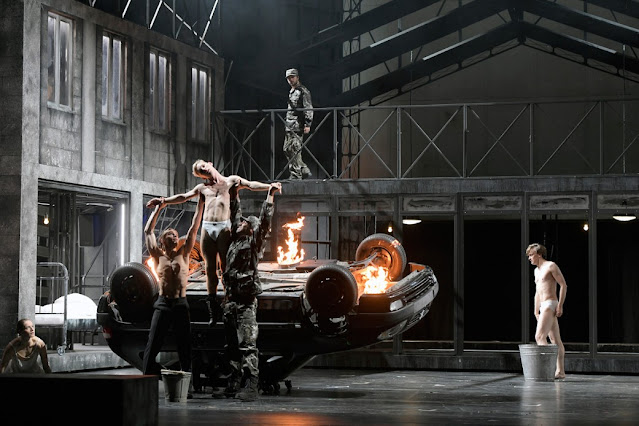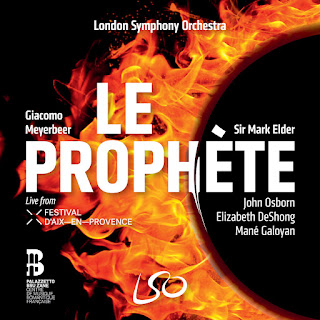Giacomo Meyerbeer: Le prophète; John Osborn, Elizabeth DeShong, Mané Galoyan, Edwin Crossley-Mercer, London Symphony Orchestra, Orchestre des Jeunes de la Méditerranée, Lyons Opera Chorus, Maîtrise des Bouches-du-Rhône, Mark Elder; LSO Live (with Palazzetto Bru Zane)
Reviewed 12 August 2024
Captures the essence of this remarkable opera, listening to this performance really conveys why the opera captivated so many in the 19th century
The first critical edition of Meyerbeer’s 1849 opera, Le prophète, was published in 2011 and the 2017 recording from Essen (on Oehms Classics) conducted by Giuliano Carella was the first to record it. But that simple statement hides something more complex, the critical edition is not so much a definitive version as a template for various versions, owing to the work’s complex history.
Like other French grand operas, Le prophète was long and so subject to cuts, some sanctioned by the composer. But casting for those 1849 performances was fraught, Meyerbeer got his first choice for Fidès with the great Pauline Viardot, but had to live with Gustave-Hippolyte Roger in the title role. Roger was a lyric tenor who sang originally at the Opéra-Comique and the role of Jean had to be trimmed to suit him. Thus the composer sanctioned cuts do not exactly reflect Meyerbeer’s intentions. The recording from Essen used a very full version, giving us nigh on 215 minutes of music (that’s a hell of a long time in the theatre).
Le prophète still needs a studio recording which explores all this in the right sort of editorial detail. This is what Palazzetto Bru Zane is good at, but the company has been relatively late to recordings of Meyerbeer’s French operas. The new recording of Meyerbeer’s Le prophète is a collaboration with the London Symphony Orchestra and issued on the LSO Live label. Recorded live at the Festival d’Aix-en-Provence in 2023, it features Mark Elder conducting the combined forces of the London Symphony Orchestra and Orchestre des Jeunes de la Méditerranée, with John Osborn as Jean, Elizabeth DeShong as Fidès, Mané Galoyan as Berthe and Edwin Crossley-Mercer as Oberthal with Lyons Opera Chorus, and Maîtrise des Bouches-du-Rhône.
The recording does not come with the usual editorial superstructure that we might have expected if it had been on Palazzetto Bru Zane’s own label. The booklet is frustratingly coy as to what we are exactly hearing, but it seems to be Meyerbeer’s sanctioned 1849 version but in the new modern edition. Certainly the Essen recording has more material on it and lasts some 20 minutes longer than the LSO Live recording. Both discs have John Osborn in the title role, and I could quite happily hear him sing this for ever, but the new set has the advantages of Elisabeth DeShong as Fidès, and Mark Elder conducting the LSO.
It is easy to forget that for all his dramatic popularity in the mid to later 19th century, Meyerbeer was an almost exact contemporary of Rossini, and Meyerbeer’s musical techniques owe something to that style. Le prophète remains a challenge because the opera requires stamina from its leads, yet they must also have the flexibility and technical command to sing elaborate fioriture. The work was also written explicitly for the orchestra of the Paris Opera, one of the largest and finest orchestras of its day. The present recording uses triple woodwind with four bassoons, four horns and a brass section of eight (with two trumpets doubling cornet), plus a banda (made up by the Mediterranean Youth Orchestra) of ten horns and brass with two percussion. All that plus the Lyons Opera Chorus and the children of Maîtrise des Bouches-du-Rhône.
 |
| Giacomo Meyerbeer: Le prophète at the Grand Théâtre de Provence, France, as part of the Festival d’Aix-en-Provence 2023 |
The opera presents the listener with a series of grand theatrical set pieces, including Jean’s powerful prayer which is part of the finale to Act Three, the coronation scene in Act Four and the bacchanalian finale to Act Five with Jean and Fidès’s immolation. All this is matched by music of suitable drama and grandeur, once you accept the slightly old-fashioned nature of Meyerbeer’s style. You can understand why the young Wagner was miffed when he heard Le prophète and experienced the adulation it achieved. Dramaturgically the opera is not a patch on Wagner, but in terms of what Meyerbeer was trying to achieve using French grand opera, the work is superb.
And the advantage of this disc is Mark Elder understands it, the pacing is spot on. The solo moments, including quite short ones, are given space to allow the fioriture to flower, the drama to develop, yet each of the finales has a fine dramatic impetus which projects the drama forward inexorably.
When it comes to the title role, you can hear John Osborn ten years younger and in a fuller version of the part on the recording from Essen, but here he remains ideal in the role. Osborn has the flexibility to do justice to vigorous passagework, yet also delicacy and is tireless. In Act Two, he turns in lyrical pastoralism when singing of his beloved, but his Act Three prayer is powerful indeed. Osborn’s is a straightforward account of the role, this Jean believes in himself, there is little self-doubt. But In Act Four, there is a terrific face off between mother and son, which leads to the opera’s finale where Jean is returned to himself. Here Osborn’s sheer stamina pays off. After a long sing, in a live recording, what he achieves is impressive indeed.
But the deciding factor on the disc, when it comes to the soloists, is Elizabeth DeShong who gives such a vivid performance as Fidès, Jean’s mother. At first she is a somewhat put-upon, plaintive figure, something DeShong does well, yet in Act Four she moves from the touching to the urgent, climaxing in the Imprecation, when she denounces the Prophet, which is vicious in the extreme. Here, DeShong’s power, ease and flexibility in the upper register really come to the fore, and her technical command is admirable. Something that we come to appreciate fully in her great Act Five double aria, a powerful and moving cavatina leading to a caballetta notable for the vivid brilliance of the singing.
Mané Galoyan makes a fine contribution as Berthe, fully equal to the decorative fireworks in the opening scenes, blending in the duet with DeShong, yet balancing the contributions from Osborn and DeShong in Act Five with a superb trio. Edwin Crossley-Mercer swaggers wonderfully and contributes some vivid moments as Oberthal. Crossley-Mercer has a strong grasp of the style, and his performance makes you wish there was more of the character.
One of Meyerbeer’s brilliant innovations in the opera is three Anabaptists who tend to appear as a trio. Here James Platt, Guilhem Worms and Valerio Contaldo make a superb trio, mining Meyerbeer’s writing for the ultimate in creepiness. From the word go, it is clear these three are up to no good. Platt is also strong in the solo moments he gets, singing with a nice self-importance and swagger.
Le prophète is a remarkable opera, its hero is the opposite of that, deluded and rather unlikeable; Meyerbeer and librettist Scribe have crafted truly disturbing portrait of a religious demagogue that still resonates. Whilst there is an element of love-interest, Jean’s beloved, Berthe, is very much side lined and the main relationship in the opera is between Jean and his mother, their conflicts in Acts Four and Five both drive the drama and lead to the opera’s radiant conclusion. And it is these acts that really take fire here, the Act Three is full of terrific drama, but Acts Four and Five seem to have white-hot dramatic impetus.
This recording is not ideal and is not perfect. But it captures the essence of this remarkable opera, and unlike some recordings, listening to these discs really conveys why the opera captivated so many in the 19th century.
 |
| Meyerbeer: Le prophète – Deutsche Oper Berlin, 2017 (Photo Bettina Stöß) |
Frustratingly, the Essen recording seems unavailable at the moment, which leaves the rather older one with Marilyn Horne and James McCracken, recorded well before critical editions but with some terrific singing. The biggest regret, however, is that Deutsche Oper, Berlin’s terrific stage production, directed by Olivier Py, [see my review] is not available on DVD.
Giacomo Meyerbeer (1791-1864) – Le prophète (1849) [3:15:34]
Jean – John Osborn
Fidès – Elisabeth DeShong
Berthe – Mané Galoyan
Oberthal – Edwin Crossley-Mercer
Zacharie – James Platt
Mathisen – Guilhem Worms
Jonas – Valerio Contaldo
With Maxime Melnik, Hugo Santos, David Sanchez
London Symphony Orchestra
Orchestre des Jeunes de la Méditerranée
Lyons Opera Chorus
Maîtrise des Bouches-du-Rhône
Mark Elder
Recorded live on 15 July 2023, at the Grand Théâtre de Provence, France, as part of the Festival d’Aix-en-Provence 2023
LSO Live 3CDs [66:31, 55:15, 73.49]
Never miss out on future posts by following us
The blog is free, but I’d be delighted if you were to show your appreciation by buying me a coffee.
Elsewhere on this blog
- Songs from two golden ages: Nicholas Mulroy, Elizabeth Kenny & Toby Carr in a recital of effortless beauty – record review
- Everything is connected: Barbican Quartet on their debut album, Manifesto on Love, on Genuin label – interview
- Vivacity, humour & pathos: Opera Holland Park & Charles Court Opera in Gilbert & Sullivan’s The Yeomen of the Guard – opera review
- Prom 24: Vividness & virtuosity in an astonishing danced staging of Purcell’s The Fairy Queen – opera review
- Prom 23: riveting symphonic theatre from Benjamin Grosvenor, Edward Gardner & LPO in Busoni’s Piano Concerto – concert review
- The encounter that never was: composers Alex Ho and Sun Keting on their collaboration on a new music theatre work interweaving the stories of two very different Chinese women – interview
- More than entertainment: Oliver Webber and the Monteverdi String Band’s The Madrigal Reimagined – record review
- Confidence, style and engagement: Rossini’s The Barber of Seville at West Green House Opera is a complete delight – opera review
- An eclectic mix: Brixton Chamber Orchestra at Clapham Park Cube – review
- Prom 10: Ryan Wigglesworth, Laura van der Heijden & BBC Scottish Symphony Orchestra in Britten, Cheryl Frances Hoad & Elgar – concert review
- She played and sang: Gillian Dooley’s new book is the fruit of 15 years research on Jane Austen’s music collection – interview
- Home









